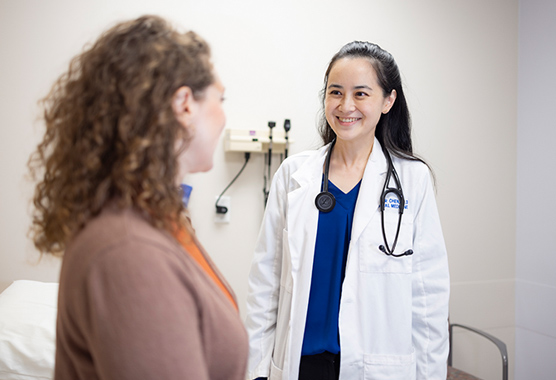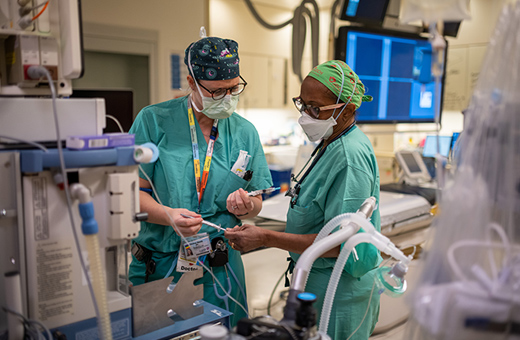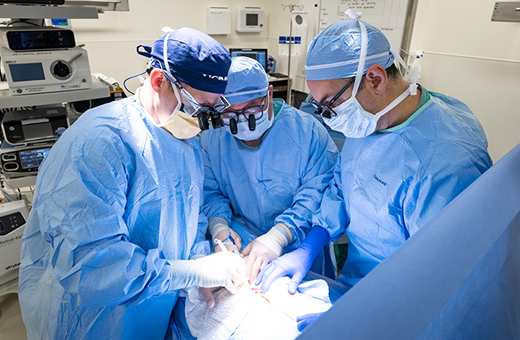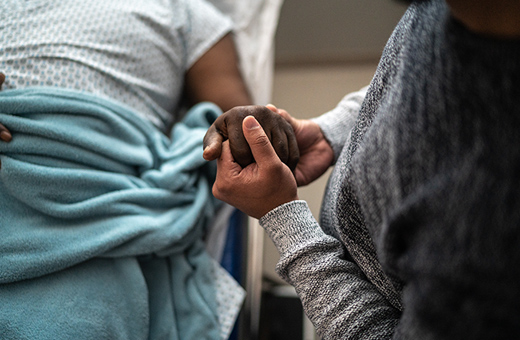Pancreas Transplant
If you have diabetes, a pancreas transplant can end the need for insulin shots and improve your health.
Medically reviewed by Naeem Goussous, M.D. on Sep. 05, 2023.

Early Adopter of Innovative Transplant Procedures
Our transplant team has used cutting-edge surgical techniques for 30 years. We were an early adopter of pancreas transplant surgery to treat diabetes.
UC Davis Transplant Center surgeons and specialists share a commitment to innovation and patient-focused care. Our research helps drive advances in transplant procedures and technology.
Types of Pancreas Transplant Surgery
Pancreas transplant surgery treats patients with diabetes, a disorder that affects your body’s ability to control blood sugar levels. Your new pancreas produces insulin to maintain healthy blood sugar levels. Because diabetes can also cause kidney failure, kidney and pancreas transplants often happen in the same procedure.
Pancreas After Kidney Transplant (PAK)
We PAK transplants to people with diabetes who have already had a successful kidney transplant.
Pancreas Transplant Alone (PTA)
Your provider may recommend a PTA if you have diabetes with healthy kidney function. During this procedure, your surgeon places a healthy donated pancreas in your body. The surgeon attaches the new pancreas to your blood vessels and intestine or bladder. Your diseased pancreas stays in your body.
Simultaneous Pancreas and Kidney Transplant (SPK)
If you experience kidney failure from diabetes, your provider may recommend a SPK. During this procedure, a surgeon places a healthy donated pancreas and kidney in your body.
Request an Appointment
As Sacramento's No. 1 hospital, you'll benefit from unique advantages in primary care and specialty care. This includes prevention, diagnosis and treatment options from experts in 150 specialties.
Referring Physicians
To refer a patient, submit an electronic referral form or call.
800-4-UCDAVIS
Patients
Call to make an appointment.
Consumer Resource Center
800-2-UCDAVIS
When a new pancreas becomes available, you’ll need to arrive at the hospital immediately to prepare for surgery. The transplant must take place within 12 to 15 hours after surgeons remove the healthy pancreas from the donor.
-

Pre-Operation
When you arrive at the hospital, your anesthesiologist and surgeon will discuss the details of your procedure with you. A nurse will place an IV in your arm so you can receive fluids and medication during your surgery.
-

During Surgery
Pancreas transplant surgery requires general anesthesia. Your anesthesiologist will give you medicine in your IV that puts you in a deep sleep. You will not be awake or feel pain during the procedure. Your surgeon will make an incision in your abdomen. Your anesthesiologist will watch your blood pressure, breathing and pulse while your surgeon places the new pancreas in your body.
-

Post-Operation
After your surgery, you will spend a day or two in the intensive care unit (ICU). Your transplant care team will check for signs of infection or organ rejection. After that, you will move to a regular hospital room. You will stay in the hospital for about a week if there are no complications.
Home Care
Your transplant care team will give you detailed instructions for your home care. They will prescribe immunosuppressant medications to stop your body from rejecting your new pancreas. They will also teach you how to check for signs of infection or organ rejection.
Continue Your Medications
Take your medications exactly as prescribed. You will take immunosuppressant medicines for the rest of your life.
Keep All Check-up Appointments
You will have regular follow-up appointments and tests to make sure your new pancreas is healthy and producing insulin.
Make Lifestyle Changes
Your provider will recommend a healthy diet and exercise plan. Both are important to keep your pancreas healthy.
When to Contact Your Surgeon
Call your surgeon right away if you experience any signs of infection or organ rejection. These include elevated blood sugar, fever, increased pain in your abdomen or nausea.

Ranked among the nation’s best hospitals
A U.S. News & World Report best hospital in cardiology, heart & vascular surgery, diabetes & endocrinology, ENT, geriatrics, neurology & neurosurgery, and pulmonology & lung surgery.

Ranked among the nation’s best children’s hospitals
U.S. News & World Report ranked UC Davis Children’s Hospital among the best in pediatric nephrology, orthopedics*, and pulmonology & lung surgery. (*Together with Shriners Children’s Northern California)

Ranked Sacramento’s #1 hospital
Ranked Sacramento’s #1 hospital by U.S. News, and high-performing in aortic valve surgery, back surgery (spinal fusion), COPD, colon cancer surgery, diabetes, gynecological cancer surgery, heart arrhythmia, heart failure, kidney failure, leukemia, lymphoma & myeloma, lung cancer surgery, pacemaker implantation, pneumonia, prostate cancer surgery, stroke, TAVR, cancer, orthopedics, gastroenterology & GI surgery, and urology.

The nation’s highest nursing honor
UC Davis Medical Center has received Magnet® recognition, the nation’s highest honor for nursing excellence.

World-class cancer care
One of ~59 U.S. cancer centers designated “comprehensive” by the National Cancer Institute.

A leader in health care equality
For the 13th consecutive year, UC Davis Medical Center has been recognized as an LGBTQ+ Healthcare Equality Leader by the educational arm of America’s largest civil rights organization.
